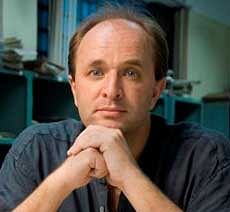

Dalrymple, whose book has been a bestseller since it came out last year, says he thought the subject of 'Nine Lives' was the most difficult to sell to a desi audience.
However, the book that dealt with sacred stories in a modern India and marked Dalrymple's return to travel writing, became the first one for him to sell far more copies in India than in Britain.
"India became my largest market with this book, may be because of the relationship with the subject, but it was real Indian subject and I would have been worried if it had done well only in the West," Dalrymple said in an interview.
"I mean if it had done well in the West...and had been regarded as inauthentic by Indians then I would really be worried," he said.
By that yard, the extraordinary response of Indians was a pleasant surprise, he says, may be because "this was not a very familiar subject with a person living in Sheffield".
Though the promotion spree of the book is going to continue for another six months, Dalrymple is toying with a range of ideas to narrow down on the subject he would take up next.
"The ideas include Aurangzeb, Robert Clive or my ancestors and their relationship with India, but I am not yet decided what I am writing next," Dalrymple said, adding, "May be I will take time off or travel before the next book takes up 2-3 years of time."
According to him, the book was in many ways his first discovery of Hindu India or at least a different level of engagement with the subject.
"I really enjoyed sort of discovering Hindu India, particularly the more marginal regional sides of it with 'Nine Lives', which is really my first Hindu book," said the author of loved books like 'City of Djinns', 'Holy Mountain', 'White Mughals', and the 'Last Mughal', among others.
"There was lot of reference to Hinduism in the age of Kali but I had no idea of the synchronism Hindu-Muslim interaction still going on in places like Sindh and in this sense it was a fresh discovery," he said.
India and the Middle East has been the author's forte for quite a long time, but he says once over with the two regions, he would also like to explore South East Asia, particularly places like Cambodia, Myanmar and Bhutan.
"If I had to do anything beyond the Middle East and India, it would be Cambodia. It is interesting to note how the battles of Mahabharata and scenes from Ramayana are depicted in temples in a place 4,000 miles away from India.
"The whole story of how it got there hasn't been told in recent times," he said.
The author also confessed that he was afraid that stories might one day run out for him from his favourite destination India, and says he was saving every author's must do Varanasi for that time.
"I am frightened of the fact that India which is my great love of my live will be gradually running out of stories for me, and I have consciously kept the very obvious one for future -- Varanasi -- which I am not going to do till I am 50," he said.
"It is Varanasi, which will be taken up in the second half of my life and the northeast. I would also love to write a book on Kerala some day," he said.